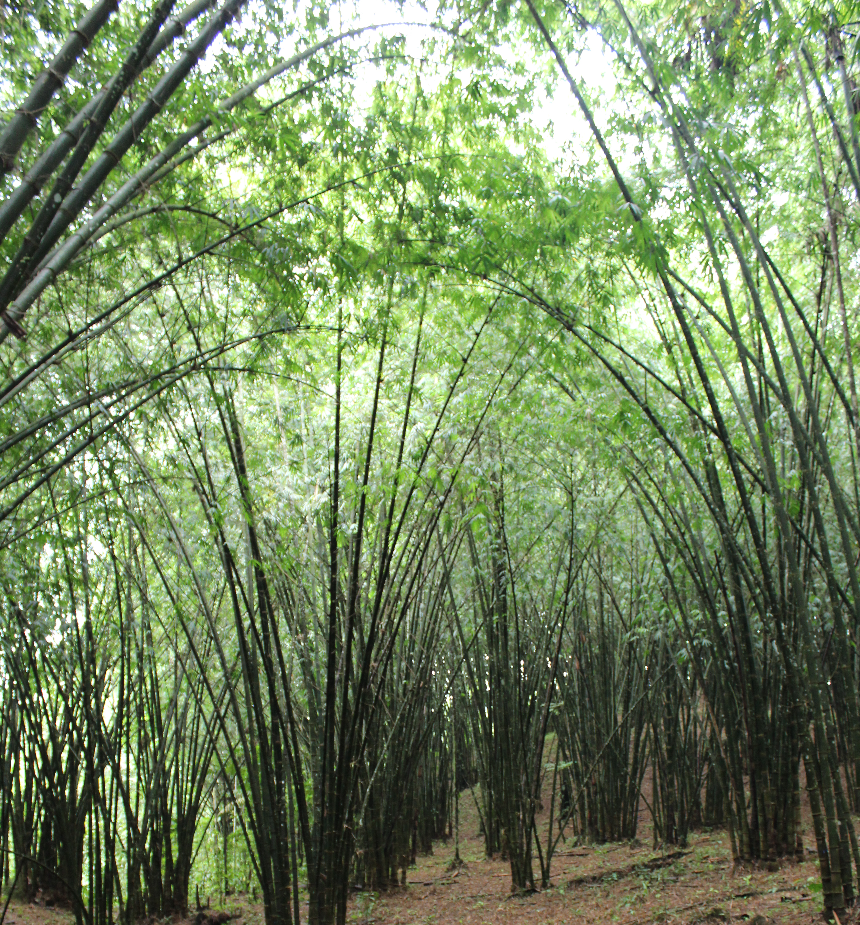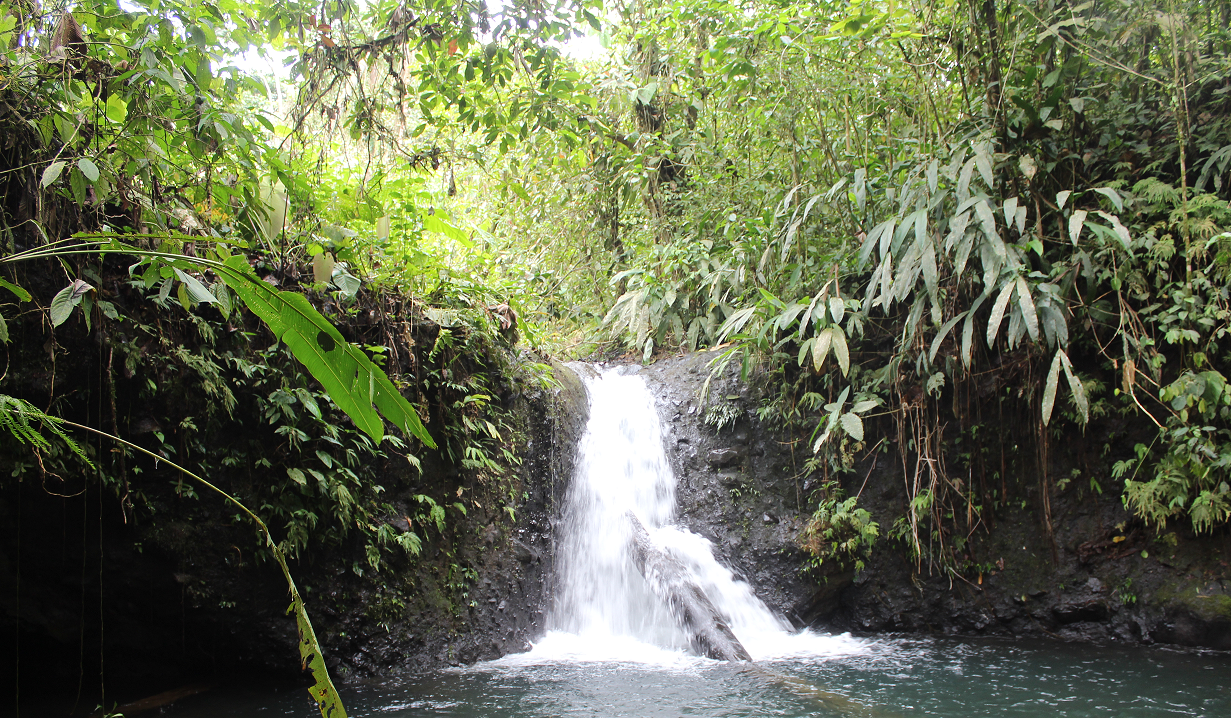Sertificētas bambusa plantācijas uzlabo ūdens kvalitāti Ekvadorā.
Two bamboo plantations which protect watershed and help improve downstream water quality in Pichincha Province, Ecuador have recently been certified against the FSC™ (Forest Stewardship Council™) Ecosystem Services Procedure for its efforts in preserving the ecosystem services. This is the first FSC Ecosystem Service Certification in the Andean countries. The certification process was conducted by NEPCon, in close collaboration with FSC Ecuador.
Ecosystem services such as water, carbon, biodiversity, soil, and recreational services bring a wide range of benefits, from reliable flows of clean water to productive soil and carbon sequestration. In 2018, FSC introduced the Ecosystem Procedure aimed at rewarding those who responsibly manage forests, thereby conserving ecosystem services.

This procedure provides a global approach that FSC certificate holders can use to demonstrate the impact of their forest management activities on ecosystem services. The FSC provides tools for businesses and governments to demonstrate and communicate the impact their purchases, investments and financial support have on the conservation and restoration of forest ecosystem services. A different tool is available for forest managers to demonstrate the preservation of ecosystem services.
It was a new procedure in Ecuador that led to the consolidation of a technical alliance between FSC International and NEPCon in Latin America. Paulina Soria, National Coordinator from FSC Ecuador says the cooperation helped highlight the contribution of companies, brands or businesses with FSC Certification in conserving the ecosystem services.
“This learning experience also gives prominence to new initiatives taken by small producers that demonstrates the importance of good practices in responsible forest management. NEPCon provided substantial support to smoothen this procedure.”
Bamboo and water: Positive impact of this evergreen plant on water and soil
Allpa Bambú is a private family-run company that manages more than 140 hectares of plantations of giant bamboo (Dendrocalamus asper) and Guadua bamboo. The company decided to apply for FSC Ecosystem Services Certification to maintain and improve stream water quality, which is protected and restored through enhancement measures of bamboo management.
“We want to change the perception that bamboo does not require any type of care, that is only harvested to be sold. We want to demonstrate that good forest management can produce high-quality bamboo and can turn it into a sustainable and long-term resource, bringing positive environmental impacts,” says Nelly Arroyo, Manager at Allpa Bambú.
The FSC Ecosystem Services Procedure allowed Allpa Bambú to demonstrate that its bamboo plantations have improved water quality in the surrounding environment and that responsible management of these plantations has improved water purity from existing sources.
Allpa Bambú, and surrounding local communities benefitted from this measure as the water flows in, out and around the plantations while water supply remains steady all year long.
The Guidance for Demonstrating Ecosystem Services Impacts was used by Allpa Bambú to specify and demonstrate specific positive impacts that its activities have on watershed services. Participatory monitoring methods were also used to demonstrate the difference in water quality recorded when this same piece of land was used for cattle rearing, and how the planting of bamboos have successfully brought a steady stream of water.
Other methodologies were also used to verify that bamboo plantations stabilise soil and reduce erosion, and it leads to clearer and purer water because filtration of water through soils reduces pollutants.

“These evaluation methodologies allow small producers to avoid incurring in additional technical costs since the same producer can carry out evaluation and monitoring through observation,” explains Karla Salvador from FSC Ecuador Technical Team.
It starts with responsible forest management
Those to be certified against the FSC Ecosystem Services Procedure must first obtain FSC Forest Management Certification. For Allpa Bambú, it started when they became an FSC-certified forest as the certification demonstrates they have conducted responsible forest practices to their buyers. Their combined FSC Forest Management/Chain of Custody Certification enables Allpa Bambú to sell bamboo products locally and internationally. The additional FSC Ecosystem Services Procedure provides an opportunity to promote FSC-certified products and use the Ecosystem Services claims to communicate their achievements and reach potential buyers.
Paulina says Allpa Bambú is a fine example demonstrating how it achieved certification according to the FSC Small and Low-Intensity Managed Forest (SLIMSF) procedures. It is contrary to a common misperception that the FSC system has a complicated process that is unsuitable for small producers.
“The FSC standard is developed whereby stringent requirements are applicable for those with high-intensity forest management, while for small producers, the rules remain the same, but sources of verification are different, considering the forests are managed at low intensity,” she adds.
The all-women team completes both certification procedures
In 2015, FSC took a major step on gender issues by adopting Criterion 2.2 in the FSC Principles and Criteria (P&C V5-2 EN), to promote gender equality in employment practices, training opportunities, awarding of contracts, processes of engagement and management activities. Through the adoption, FSC is committed to promoting Gender Equality in its work.
In Allpa Bambú’s case, the entire certification process was led and completed by five women. Nelly Arroyo was tasked with managing the sustainable strategy and overseeing responsible practices within Allpa Bambú. Yadid Ordoñez from FSC International, Karla Salvador and Paulina Soria from FSC Ecuador were responsible for ensuring the correct application of methodologies while Alejandra Balanda from NEPCon conducted fieldwork during the auditing process.
All activities in this procedure required these women to be involved in technical and production activities, research, fieldwork and other administrative tasks, to name a few. It highlights women’s active participation and involvement in the FSC community.
Read more about the FSC certification for ecosystem services here. If you would like your business and/or forest to become certified against the FSC Procedure, speak to Mateo Cariño Fraisse, NEPCon Land Use Programme Manager.
We also provide training in FSC Ecosystem Services. Our upcoming Expert Course will be held in Perú next year. Find out more information here.